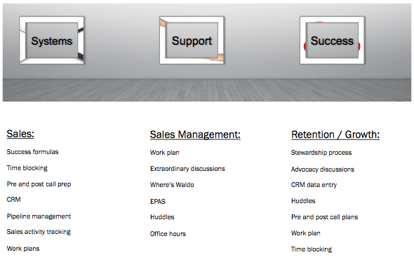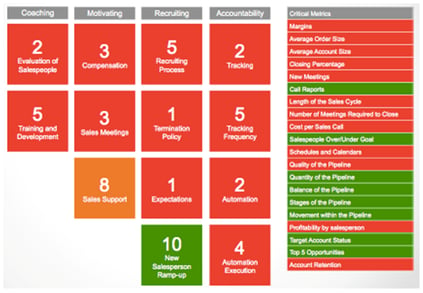Why Sales Accountability Matters
Most companies want accountability but focus on the wrong metrics. They track closed sales as the main measurement. The problem is that closed sales are lagging indicators. Looking only at closes is like driving while staring in the rearview mirror. You see what has already happened, but you miss the predictive activity that drives future success.
Instead, we need to measure forward-looking metrics such as:
-
Prospecting dials made
-
Appointments set
-
Appointments kept
-
Second meetings scheduled
Tracking these activities gives sales leaders critical ratios, such as dials to first appointments or dials to closed sales. With this data, you can set intelligent goals and begin to coach true sales accountability.
Coaching at Every Step of the Process
Effective managers track and inspect each step of the sales process, from initial calls to proposals and closes. When you hold salespeople accountable for activity, you gain the ability to predict outcomes with much greater accuracy.
For example, if Jane typically averages 15 calls for every closed deal, but she is only making 10 calls, it is no surprise she is missing her goals. Without accountability to her ratios, she cannot improve.
The Role of Consequences in Accountability
Tracking numbers only works if the data is used to hold people accountable to promised goals. This requires tough conversations. Ask each salesperson:
“What will happen if you do not reach this goal? What are the consequences if you don’t achieve Extraordinary?”
This shifts responsibility back to the salesperson. If Bill shrugs and says, “Maybe next month,” you may not have the right person in the role. If he is serious, he will connect his missed goals to personal consequences such as financial strain or delayed family plans.
Eliminating Excuses in Sales
Excuses are one of the biggest barriers to accountability. In Objective Management Group’s assessments, about 66% of salespeople admit to making excuses for poor performance. They blame the company, the competition, or the market instead of taking ownership. Left unchecked, this mindset lowers standards across the organization.
Consider this example: Jane misses her call goal because she was busy handling operational issues. She blames the company. Your response should be, “Jane, if I did not let you use that as an excuse, what would you have done differently?”
This question forces her to think through the problem and identify what must change. It removes the option of excuse-making and reinforces accountability.
Building a No-Excuses Culture
Sales accountability is a full-time job. Excuses will always surface in new forms, so train yourself to recognize them and respond consistently. Practice using the critical accountability question:
“If I did not let you use that excuse, what would you have done differently?”
Use it often and you will notice how quickly it changes the tone of conversations. Over time, it helps create a culture where salespeople own their results, and managers can coach to meaningful behaviors instead of debating excuses.
FAQ: Sales Accountability
What is sales accountability?
Sales accountability is the practice of tracking and inspecting key sales activities, then holding salespeople responsible for meeting their promised goals and activity levels.
Why is sales accountability important?
It creates predictability in sales results, eliminates excuse-making, and ensures salespeople focus on the right activities that drive revenue.
What metrics should managers track for sales accountability?
Instead of only tracking closed deals, managers should monitor calls made, appointments set and kept, second meetings, proposals, and conversion ratios.
How can managers address excuses from salespeople?
By using the accountability question: “If I did not let you use that as an excuse, what would you have done differently?” This shifts responsibility back to the salesperson.
How does sales accountability improve sales performance?
When salespeople know they will be held to activity standards and ratios, they adjust behaviors proactively. This increases consistency, accuracy in forecasting, and overall sales growth.






